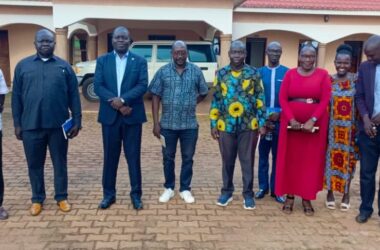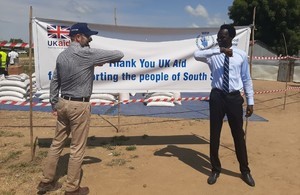By Kei Emmanuel Duku
South Sudan’s National Minister of Health, Sarah Cleto Rial, has unveiled plans to bolster the country’s healthcare system.
Among her top priorities are establishing a Hospital Board of Management committee and resolving a dispute between Juba Teaching Hospital and National Revenue Authority.
Recently, South Sudan Revenue Authority deployed staff to the hospital to collect fees from patients, a move met with resistance from Juba Teaching Hospital’s management.
Minister Rial acknowledged hearing complaints from the hospital management and confirmed receiving a letter from the Revenue Authority, regarding their proposed plans.
She assured healthcare workers that the Ministry plans to address the confusion between the revenue authority and hospital management.
Speaking at “Topping-Out Ceremony” of Juba Teaching Hospital on Tuesday, Rial emphasized the importance of hospital board, describing it as a cornerstone for implementation of sound administrative policies.
“Hospital administration policy and other practices to help the hospital to work, to function well, such as the cost-sharing policy, all of this needs for us to pay attention,” Rial stated.
The Health Minister also announced a countrywide tour to directly assess and understand the challenges facing the nation’s health system. An initiative that will involve visits to hospitals, allowing her to engage with staff and administration.
“I will be conducting a rapid assessment of the current state of hospitals and primary healthcare infrastructure, staffing levels, drug supply chains, and disease burden,” Rial stated, outlining her initial priorities.
Acknowledging a critical infrastructure need, Minister Rial highlighted the importance of a stable electricity supply, especially at Juba Teaching Hospital.
“We need partners to help provide the hospital with a power system to stabilize the hospital because without electricity, the hospital will not function well, and we are losing lives due to lack of power,” she added.
Beyond infrastructure and policy, the Minister plans “suppositional visits” to listen directly to the challenges faced by frontline workers, community leaders, and beneficiaries. These visits aim to gain a real-time understanding of challenges and expectations.
“I know our healthcare infrastructure is emerging, and we need to continue strengthening the infrastructure to support its operations,” she explained, expressing a desire to hear from those on the ground regarding salaries, human resources, capacity, and the overall state of hospital sanitation.
She expressed confidence that through collective efforts, significant strides can be made in improving healthcare outcomes.
“I am confident that through collective efforts we can make significant strides in improving healthcare outcomes and achieving a healthcare future that is bright for all of South Sudanese and everyone who lives in South Sudan,” the Minister concluded.



